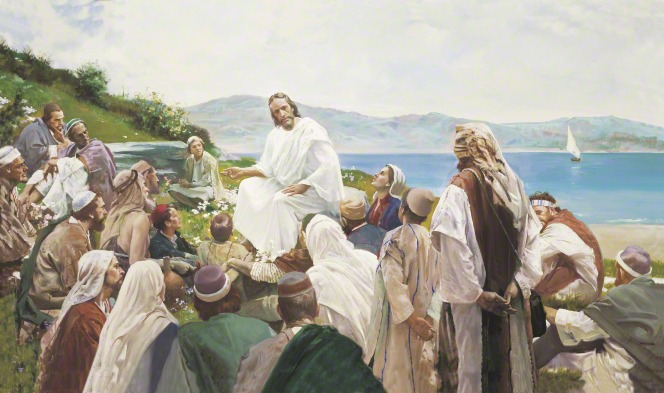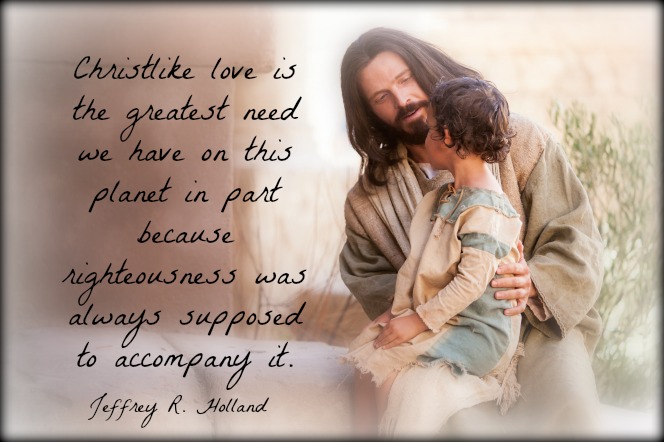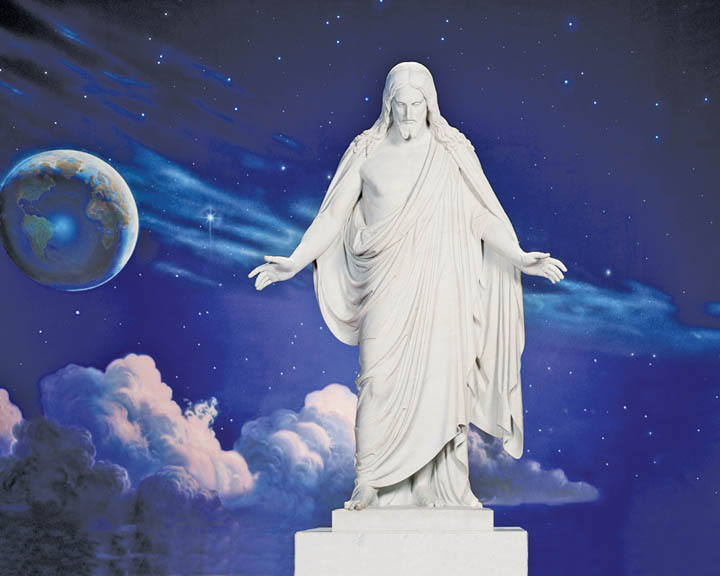In the world today, it can be difficult to know which voice to follow, which path to take. For centuries, the United States of America was known as a religious nation. But slowly, Americans have, in greater numbers, turned away from the teachings of God toward the wisdom of the world. Advocates of the new social agendas are mixing the messages of the Savior and secularism, causing even more confusion—especially among the rising generation. They see the secular wisdom of “humanism,” which often rejects God as the source of ultimate truth. They see a perceived inequality in religious teachings that denounce same-sex marriage and the ordination of women to the priesthood. They wonder how a just and loving God would allow such perceived discrimination and injustice.
These are valid questions that each person must address for him- or herself. But at the root of this discussion must be this: Which source will we trust for our information? For members of The Church of Jesus Christ of Latter-day Saints (sometimes inadvertently called the Mormon Church), this source is the Savior and His chosen prophets and apostles. We learn how to judge righteously in an increasingly wicked world as we understand the source to which we must look for truth—and why truth does not change with the whims of the world.
Why Can’t the LDS Church Get With the Times?
We live in day where it seems like anything goes. If it feels good, do it. But not everyone is adopting these philosophies. One of the biggest questions that some members of the rising generation have is why The Church of Jesus Christ and other religions aren’t changing with the times. Elder Dallin H. Oaks, a member of the Quorum of the Twelve Apostles (with the First Presidency, the governing body of The Church of Jesus Christ), said:
The philosophy of moral relativism, which holds that each person is free to choose for him or herself what is right and wrong, is becoming the unofficial creed for many in the United States and other Western nations. At the extreme level, evil acts that used to be localized and covered up like a boil are now legalized and paraded like a banner. Persuaded by this philosophy, many of the rising generation are caught up in self-serving pleasures, pornography, dishonesty, foul language, revealing attire, pagan painting and piercing of body parts, and degrading sexual indulgence.
As these trends become not only popular but socially acceptable as well, the question becomes: Why are religions so against the new normal? Elder Oaks explains:
We believe in absolute truth, including the existence of God and the right and wrong established by His commandments. We know that the existence of God and the existence of absolute truth are fundamental to life on this earth, whether they are believed in or not. We also know that evil exists and that some things are simply, seriously, and everlastingly wrong.
Because The Church of Jesus Christ and other religions have not changed with the political and social climate, Church leaders have been accused of being out of touch. To this, Elder M. Russell Ballard, an Apostle of Jesus Christ, explained:
I have heard that some people think the Church leaders live in a “bubble.” What they forget is that we are men and women of experience, and we have lived our lives in so many places and worked with many people from different backgrounds. Our current assignments literally take us around the globe, where we meet the political, religious, business, and humanitarian leaders of the world. Although we have visited the White House in Washington, D.C., and leaders of nations throughout the world, we have also visited the most humble homes on earth, where we have met and ministered to the poor.
When you thoughtfully consider our lives and ministry, you will most likely agree that we see and experience the world in ways few others do. You will realize that we live less in a “bubble” than most people. … We have experienced it all, including the consequences of different public laws and policies, disappointments, tragedies, and deaths in our own families. We are not out of touch with your lives.
And they are not out of touch with the times. They cannot, however, change doctrine that is not their own.
These are the Doctrines of Christ
The doctrines and policies of The Church of Jesus Christ cannot be altered to fit the ideals and philosophies of the day. In a democracy, change comes through the voice of the people. But The Church of Jesus Christ is not a democracy. Rather, it is a theocracy—meaning that God is the head of the Church. The late President Gordon B. Hinckley, until his death the prophet and president of The Church of Jesus Christ, said:
… Let it be understood by all that Jesus Christ stands at the head of this church which bears His sacred name. He is watching over it. He is guiding it. Standing at the right hand of His Father, He directs this work.
When the Savior lived on the earth, He organized His Church, calling Apostles and ordaining them to His priesthood, which is the power that God gives to man to act in all things for the salvation of His children. The modern Church of Jesus Christ is organized in the same manner, with the same priesthood power. President Hinckley said:
The First Presidency and the Council of the Twelve Apostles, called and ordained to hold the keys of the priesthood, have the authority and responsibility to govern the Church, to administer its ordinances, to expound its doctrine, and to establish and maintain its practices. Each man who is ordained an Apostle and sustained a member of the Council of the Twelve is sustained as a prophet, seer, and revelator.
Together, the First Presidency and the Quorum (or Council) of the Twelve Apostles are the governing body of The Church of Jesus Christ. Thus, all policy, procedure and doctrine come through these channels. Elder D. Todd Christofferson, an Apostle of Jesus Christ, explained:
In some faith traditions, theologians claim equal teaching authority with the ecclesiastical hierarchy, and doctrinal matters may become a contest of opinions between them. Some rely on the ecumenical councils of the Middle Ages and their creeds. Others place primary emphasis on the reasoning of post-apostolic theologians or on biblical hermeneutics and exegesis. We value scholarship that enhances understanding, but in the Church today, just as anciently, establishing the doctrine of Christ or correcting doctrinal deviations is a matter of divine revelation to those the Lord endows with apostolic authority.
And how is this accomplished? President Hinckley taught:
No decision emanates from the deliberations of the First Presidency and the Twelve without total unanimity among all concerned. At the outset in considering matters, there may be differences of opinion. These are to be expected. These men come from different backgrounds. They are men who think for themselves. But before a final decision is reached, there comes a unanimity of mind and voice. This is to be expected if the revealed word of the Lord is followed.
… I have seen differences of opinion presented in these deliberations. Out of this very process of men speaking their minds has come a sifting and winnowing of ideas and concepts. But I have never observed serious discord or personal enmity among my Brethren. I have, rather, observed a beautiful and remarkable thing—the coming together, under the directing influence of the Holy Spirit and under the power of revelation, of divergent views until there is total harmony and full agreement. Only then is implementation made. That, I testify, represents the spirit of revelation manifested again and again in directing this the Lord’s work.
These are the doctrines and teachings of Jesus Christ—His Church, His gospel and only He can make these changes.
Mixing the Messages of Jesus Christ with the Philosophies of Men
There are many masters of spin in the world today—and the teachings of Jesus Christ are not exempt from this manipulation. Elder Jeffrey R. Holland, an Apostle of Jesus Christ, taught:
Sadly enough, my young friends, it is a characteristic of our age that if people want any gods at all, they want them to be gods who do not demand much, comfortable gods, smooth gods who not only don’t rock the boat but don’t even row it, gods who pat us on the head, make us giggle, then tell us to run along and pick marigolds.
Talk about man creating God in his own image! Sometimes—and this seems the greatest irony of all—these folks invoke the name of Jesus as one who was this kind of “comfortable” God. Really? He who said not only should we not break commandments, but we should not even think about breaking them. And if we do think about breaking them, we have already broken them in our heart. Does that sound like “comfortable” doctrine, easy on the ear and popular down at the village love-in?
… Christlike love is the greatest need we have on this planet in part because righteousness was always supposed to accompany it. So if love is to be our watchword, as it must be, then by the word of Him who is love personified, we must forsake transgression and any hint of advocacy for it in others. Jesus clearly understood what many in our modern culture seem to forget: that there is a crucial difference between the commandment to forgive sin (which He had an infinite capacity to do) and the warning against condoning it (which He never ever did even once).
The Savior does indeed love everyone—and has commanded each one of us to love and serve our neighbors. But the Savior does not condone sin. President Dieter F. Uchtdorf, second counselor in the First Presidency, said:
… We “all have sinned, and come short of the glory of God.” We are all in need of mercy. In that last day when we are called to the judgment bar of God, do we not hope that our many imperfections will be forgiven? … It seems only right and proper that we extend to others that which we so earnestly desire for ourselves.
I am not suggesting that we accept sin or overlook evil, in our personal life or in the world. Nevertheless, in our zeal, we sometimes confuse sin with sinner, and we condemn too quickly and with too little compassion. We know from modern revelation that “the worth of souls is great in the sight of God.” We cannot gauge the worth of another soul any more than we can measure the span of the universe. Every person we meet is a VIP to our Heavenly Father. Once we understand that, we can begin to understand how we should treat our fellowmen.
The world today interprets this to mean that we must accept and tolerate all behaviors—even if we find them morally reprehensible. But this is not so. Elder Oaks explained:
While we must practice tolerance and respect for others and their beliefs, including their right to explain and advocate their positions, we are not required to respect and tolerate wrong behavior. Our duty to truth requires us to seek relief from behavior that is wrong.
… For persons who believe in absolute truth, tolerance for behavior is like a two-sided coin. Tolerance or respect is on one side of the coin, but truth is always on the other. You cannot possess or use the coin of tolerance without being conscious of both sides.
Our Savior applied this principle. When He faced the woman taken in adultery, Jesus spoke the comforting words of tolerance: “Neither do I condemn thee.” Then, as He sent her away, He spoke the commanding words of truth: “Go, and sin no more” (John 8:11). We should all be edified and strengthened by this example of speaking both tolerance and truth: kindness in the communication but firmness in the truth.
The gospel of Jesus Christ is a message of love, hope, compassion and redemption. The glory of this message is that we can become like the Savior by giving away all of our sins to know Him—not by trying to change the definition of sin to fit our desires.
The Challenges of Judging and Becoming
The goal of this life, then, it to learn how to judge between what is right and what is wrong. If we want to become more like our Savior, we need to understand how this can be accomplished. Elder Oaks explained:
… The Final Judgment is not just an evaluation of a sum total of good and evil acts—what we have done. It is an acknowledgment of the final effect of our acts and thoughts—what we have become. It is not enough for anyone just to go through the motions. The commandments, ordinances, and covenants of the gospel are not a list of deposits required to be made in some heavenly account. The gospel of Jesus Christ is a plan that shows us how to become what our Heavenly Father desires us to become.
This begins by learning to choose the correct path to follow. And this is where the challenge of judging in the appropriate way comes in. Elder Oaks said:
We all make judgments in choosing our friends, in choosing how we will spend our time and our money, and, of course, in choosing an eternal companion. … Whenever possible we will refrain from judging people and only judge situations. This is essential whenever we attempt to act upon different standards than others with whom we must associate—at home, at work, or in the community. We can set and act upon high standards for ourselves or our homes without condemning those who do otherwise.





